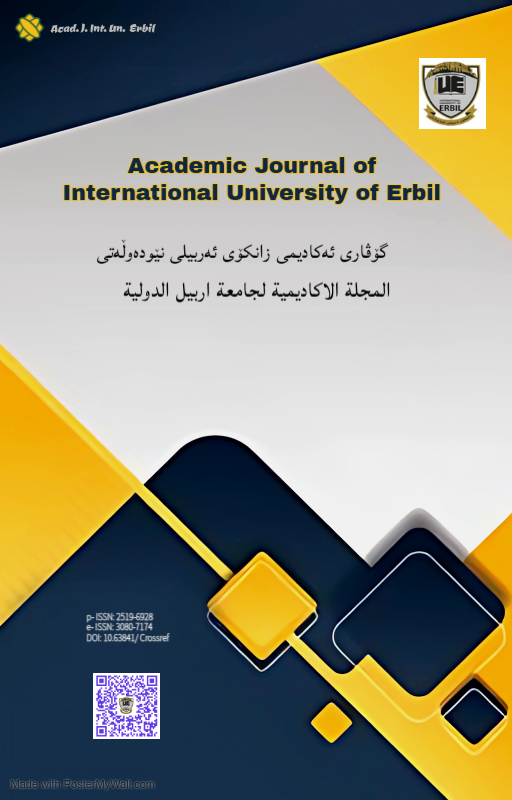The Role of AI in Targeting and Segmentation: A New Era for Marketing Professionals in the Real Estate Sector
Role of AI in Targeting and Segmentation
DOI:
https://doi.org/10.63841/iue22558Keywords:
AI, Artificial Intelligence, Marketing Professionals, Segmentation, Real EstateAbstract
This study investigates the role of Artificial Intelligence (AI) in targeting and segmentation in the real estate sector in Iraqi Kurdistan. Rapid technological advancements and AI usage in different sectors around the world brought researchers' attention to exploring AI's impact on customers' experiences and marketing professionals' willingness and readiness to leverage this technological development. To quantify their willingness and readiness, as well as whether AI influences the effectiveness of targeting and segmentation strategy, this research uses quantitative methods. Means, regression, and correlation analysis are used to investigate the relationship and impact between dependent and independent variables. Moreover, the survey includes both close-ended questions with open-ended questions. Open-ended items give researchers a chance to dive deeper into qualitative insights from respondents. This paper provides mixed results. Even though marketing professionals see AI as a useful tool in segmentation practices, their responses did not match their perception; thus, statistically, the findings were not significant. In addition, the findings reveal that AI has a positive relationship with segmentation strategies despite challenges such as data quality, lack of infrastructure, and issues related to system integration. More research on other sectors, particularly on human resources readiness and operational challenges, is needed.
Downloads
References
S. Verma, S. S. Bhattacharyya, S. Kumar, and S. K. Roy, “Artificial intelligence in marketing: Systematic review and future research direction,” International Journal of Information Management Data Insights, vol. 1, no.1, pp. 100002, 2021. https://doi.org/10.1016/j.jjimei.2020.100002
S. M. George, B. Sasikala, T. Gowthami, P. Sopna, M. Umamaheswari, and D. P. Dhinakaran, “Role of artificial intelligence in marketing strategies and performance,” Migration Letters, vol. 21, no. S4, pp. 1589–1599, 2024.
M. H. Huang, and R. T. Rust, “ Technology-driven service strategy,” J. of the Acad. Mark. Sci. vol. 45, pp. 906–924, 2017. https://doi.org/10.1007/s11747-017-0545-6
M. Basha, M. “Impact of artificial intelligence on marketing,” East Asian Journal of Multidisciplinary Research, vol. 2, no. 3, pp. 993-1004, 2023. https://doi.org/10.55927/eajmr.v2i3.3112.
J. Sterne, “Artificial intelligence for marketing: Practical applications,” Wiley. 2017. https://www.google.iq/books/edition/Artificial_Intelligence_for_Marketing/o_YtDwAAQBAJ?hl=en&gbpv=1
C. Mele, and T. Russo Spena, “Artificial intelligence in services. In Artificial intelligence in services (NP),” Edward Elgar Publishing, 2023. https://doi.org/10.4337/9781802202595.Artificial.Intelligence.in.Services
P. Thaichon, and S. Quach, S. (Eds.), “Artificial intelligence for marketing management,” [eBook], Routledge, 2023. https://www.google.iq/books/edition/Artificial_Intelligence_for_Marketing_Ma/QU-IEAAAQBAJ?hl=en&gbpv=1
S. Teixeira, and J. Remondes, (Eds.), “The use of artificial intelligence in digital marketing: Competitive strategies and tactics,” [eBook], IGI Global. 2023. https://www.google.iq/books/edition/The_Use_of_Artificial_Intelligence_in_Di/vOvkEAAAQBAJ?hl=en&gbpv=1
J. Bulchand-Gidumal, E. W., Secin, P. O’Connor, and D. Buhalis, D., “Artificial intelligence’s impact on hospitality and tourism marketing: Exploring key themes and addressing challenges,” Current Issues in Tourism, vol. 27, no.14, pp. 2345-2362, 2024. https://doi.org/10.1080/13683500.2023.2229480
H. Kim, K. K. F. So, S. Shin, and J. Li, J., “Artificial intelligence in hospitality and tourism: Insights from industry practices, research literature, and expert opinions,” Journal of Hospitality & Tourism Research, vol. 48, no.1, pp. 3-30. 2024. https://doi.org/10.1177/10963480241229235
F. D. Davis, “Perceived usefulness, perceived ease of use, and user acceptance of information technology,” MIS Quarterly, vol. 13, no. 3, pp. 319-340, 1989. https://doi.org/10.2307/249008
E. M. Rogers, “Diffusion of innovations (5th ed.), Free Press, 2003.
A. Payne, and P. Frow, “ A strategic framework for customer relationship management,” Journal of Marketing, 69(4), 167-176, 2005. https://doi.org/10.1509/jmkg.2005.69.4.167
R. Kumar, “Research methodology: A step-by-step guide for beginners [eBook]. SAGE Publications. ISBN: 9781526457080, 1526457083, 2018.
Y. K. Dwivedi, L. Hughes, E. Ismagilova, G. Aarts, C. Coombs, T. Crick, M. D. Williams, “Artificial Intelligence (AI): Multidisciplinary perspectives on emerging 46 challenges, opportunities, and agenda for research, practice and policy,” International Journal of Information Management, vol. 57, Article 101994, 2021. https://doi.org/10.1016/j.ijinfomgt.2019.08.00
M. H. Huang, and R. T. Rust, R. T. , “ A framework for collaborative artificial intelligence in marketing,” Journal of Retailing, vol. 98, no. 2, pp. 209–223, 2022. https://doi.org/10.1016/j.jretai.2021.03.001
M. H. Huang, and R. T. Rust, R. T. Artificial intelligence in service. Journal of Service Research, vol. 21, no. 2), pp. 155–172, 2018. https://doi.org/10.1177/1094670517752459
J. J. Li, M. A. Bonn, and B. H. Ye, B. H, “Hotel employee’s artificial intelligence and robotics, awareness and its impact on turnover intention: The moderating roles of perceived organizational support and competitive psychological climate,” Tourism Management, vol. 73, pp. 172–181. 2019. https://doi.org/10.1016/j.tourman.2019.02.006
G. Volkmar, P. M. Fischer, and S. Reinecke, “Artificial Intelligence and Machine Learning: Exploring drivers, barriers, and future developments in marketing management,” Journal of Business Research, vol. 149, pp. 599–614, 2022.
B. Thormundsson, “AI corporate investment worldwide 2015-2022, 2024,” Accessed on 10/02/2025 https://www.statista.com/statistics/941137/ai-investment-and-funding-worldwide/
MIT Technology Review Insights, The global AI agenda: North America. MIT Technology Review. 2020. https://mittrinsights.s3.amazonaws.com/ AIagenda2020/NAAIagenda.pdf
Y. Masnita, J. K. Ali, A. Zahra, N. Wilson, and W. Murwonugroho, “Artificial intelligence in marketing: Literature review and future research agenda,” Journal of System and Management Sciences, vol. 14, no.1, pp.120-140, 2024. https://doi.org/10.33168/JSMS.2024.0108
D. Chaffey, “Digital marketing: Strategy, implementation, and practice,” Pearson Education, 2020.
S. Brough, S. GRASPED The impact of cultural attitudes on marketing, Vol. 3: Crafting marketing magic in a culturally connected world [eBook]. GRASPED Digital, 2024. Available at: https://www.google.iq/books/edition/GRASPED_The_Impact_of_Cultural_Attitudes/B98BEQAAQBAJ?hl=en&gbpv=1
P. Kotler, and K. L. Keller, “Marketing management” (15th ed.), Pearson.,2016.
N. Hennigs, K. P. Wiedmann, and C. Klarmann, “What is luxury?,” Marketing Review St. Gallen, vol. 29, no. 4, pp. 38-45, 2012. https://doi.org/10.1362/146934712X13406919478584
S. Said, S. (2023). The role of artificial intelligence (AI) and data analytics in enhancing guest personalization in hospitality. Journal of Modern Hospitality, 2(1), 1-13, 2023.
Y. Liu, C. Gu, and J. Li, “The application of AI in luxury real estate marketing: Insights from agents and consumers,” International Journal of Market Research, vol. 63, no.3, pp. 273-290, 2021.
M. H. Huang, and R. T. Rust, “Artificial intelligence in service,” Journal of Service Research, vol. 21, no. 2, pp. 155-172, 2021. https://doi.org/10.1177/1094670517752459
C. Prentice, X. Wang, S. M. C. Loureiro, “The role of artificial intelligence in service innovation within the hospitality sector,” Journal of Hospitality Marketing & Management, vol. 29, no. 7, pp. 785-803, 2020.
F. J. Hair, P. R. Bush, J. D. Ortinuau, “Marketing Research Within a Changing Information Environment,” London: The McGraw-Hill Companies, 2002.
A. Bryman, “Social research methods,” (5th ed.). Oxford University Press, 2016.
J. F. Hair, R. E. Anderson, B. J. Babin, and W. C. Black, “Multivariate data analysis (7th ed.). Pearson, 2010.
B. Yoo, N. Donthu, and T. Lenartowicz, “Measuring Hofstede’s Five Dimensions of Cultural Values at the Individual Level: Development and Validation of CVSCALE,” Journal of International Consumer Marketing, vol. 23, pp. 193-210, 2011.
A. Bryman, and E. Bell, “Business Research Methods,” Second Edition, United States; Oxford University Press, 2007.
P. Baines, B. Chansarkar, 2002. Introducing Marketing Researc,. England: John Wiley & Sons Ltd, 2002.
J. Cohen, “Statistical power analysis for the behavioral sciences,” (2nd ed.), Lawrence Erlbaum Associates, 1988.
A. Field, “Discovering statistics using IBM SPSS statistics,” (5th ed.), Sage Publications, 2018.
F. P. Cook, “SPSS-Version, 18.0,” University of Colorado Denver, Center for Nursing Research, 2010.
https://www.google.iq/books/edition/Research_Methodology/J2J7DwAAQBAJ?hl=en&gbpv=1
Downloads
Published
Issue
Section
License
Copyright (c) 2025 Academic Journal of International University of Erbil

This work is licensed under a Creative Commons Attribution 4.0 International License.












